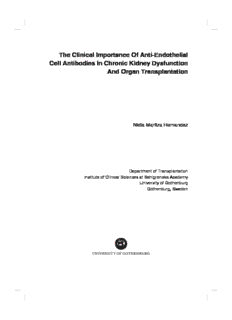Table Of ContentThe Clinical Importance Of Anti-Endothelial
Cell Antibodies In Chronic Kidney Dysfunction
And Organ Transplantation
Nidia Maritza Hernandez
Department of Transplantation
Institute of Clinical Sciences at Sahlgrenska Academy
University of Gothenburg
Gothenburg, Sweden
A Doctoral Thesis at a university in Sweden is produced either as a monograph or
as a collection of papers. In the latter case, the introductory part constitutes the
formal thesis, which summarizes the accompanying papers. These have either
already been published or manuscripts are at various stages (in press, submitted,
or in manuscript).
© Nidia Maritza Hernandez
nidia.hernandez@gu.se
ISBN 978-91-628-8932-6
http://hdl.handle.net/2077/35447
Printed by Ale Tryckteam AB
Sweden 2014
ABSTRACT
The endothelium is the thin layer of cells that lines the interior surface of blood
vessels and is the first site of contact between immune cells and tissues. Therefore,
alterations at the level of the endothelium are crucial to understand the nature of
vascular diseases and organ damage. The presence of anti-endothelial cell
antibodies (AECAs) has been associated with such conditions. However, their
immunomodulatory and clinical relevance is unclear.
This work focused on two clinical groups, patients with chronic kidney disease and
heart- and vein-transplanted patients. In chronic kidney disease patients, some
biological mechanisms by which AECAs may affect the kidney microvascular
permeability were explored. In transplanted patients, special emphasis on the
clinical contribution of these antibodies to monitor graft outcome pre- and post-
transplantation was analyzed. Detection of AECAs using different tissue endothelial
cells as targets and experimental in vitro assays were utilized to evaluate immune
interactions of AECAs.
In patients with end-stage renal disease, AECAs were specifically reactive with
kidney endothelial cells. In vitro, these antibodies decreased the expression of
intercellular junction assembly proteins altering endothelial permeability. In heart-
transplanted patients, the presence of autologous AECAs post-transplantation was
associated with the presence of donor-specific AECAs and early rejection episodes.
In the context of a first case report of a bioengineered transplanted vein, AECAs
appeared after nearly a year post-transplantation.
In summary, AECAs in patients with chronic kidney diseases may be novel
biomarkers of kidney endothelial dysfunction, and may be used as indicators of
renal diseases. Additionally, AECAs have important implications in organ
transplantation regarding the development of techniques for improved donor organ
selection and monitoring of recipients. Results may also be extended to new
approaches in tissue engineering.
3
POPULÄRVETENSKAPLIG SAMMANFATTNING
Förändringar i det innersta cellagret av blodkärl – endotelet - har visat sig ha stor
betydelse för utveckling inom djurriket. Förändringar är särskilt viktiga i samband
med uppkomst av många sjukdomar som drabbar våra organ. Förekomst av
antikroppar riktade mot endotelet (AECAs) har påvisats mot en rad sjukdomar, men
den exakta betydelsen och mekanismen av AECAs är däremot dåligt känd.
Avhandlingen fokuserar på förekomst av AECA vid njursjukdom, vid
hjärttransplantation samt vid regenerering av vener använda för att ersätta en icke
fungerande ven till levern från tarmen hos barn.
Hos njursjuka patienter påvisades AECAs kopplade till förbindelse proteiner i
kärlväggen. Den föreslagna verkningsmekanismen är att genomsläppligheten av
äggviteämnen ökar, med skada av njurfunktionen som följd.
Hos hjärttransplanterade patienter medförde förekomst av AECAs riktade mot den
egna vävnaden att risken för uppkomst av skadliga vävnads antikroppar mot
givaren (DSA) ökade. Detta kan innebära en ökad risk för både akut och kronisk
avstötning av hjärtat efter transplantation.
Vid regenerering av ven från ett acellulärt extra cellulärt (ECM) matrix från
givarblodkärl kunde AECAs riktade mot egen vävnad upptäckas efter ett år, men
det är osäkert om mängden är av signifikans eftersom materialet är litet och det är
svårigheter att veta hur stor förändring från kontroll individer som ska anses vara
signifikant.
Sammanfattningsvis kan AECAs få en potentiell roll som markör vid vissa
njursjukdomar. Vidare förekomst av AECAs vid hjärttransplantation vara en markör
för akut eller kronisk avstötning och motiverar därför ytterligare studier. Vid
regenerering av vävnader och organ – en ny teknik som börjat användas på
patienter – är det oklart om AECAs innebär en risk för patienten. Ytterligare studier
är därför motiverat även här.
5
LIST OF PUBLICATIONS
I. Hernandez NM, Casselbrant A, Joshi M, Johansson BR, Sumitran-Holgersson S.
Antibodies to kidney endothelial cells contribute to a "leaky" glomerular barrier in
patients with chronic kidney diseases. Am J Physiol Renal Physiol, 2011 Dec;
302(7):F884-894.
II. Sigurdardottir V, Kolsrud O, Hernandez N, Dellgren G. Endothelial cell antibody-
mediated rejection and successful retransplantation in a heart transplanted patient.
Eur J Cardiothorac Surg, May 2012; 42(6):1044-1046.
III. Hernandez NM, Niiniskorpi T, Torén B, Sumitran-Holgersson S, Sigurdardottir V.
A significant role for non-HLA donor-specific anti-endothelial cell antibodies in heart
allograft rejections. 2013 (Manuscript).
IV. Olausson M, Patil PB, Kuna VK, Chougule P, Hernandez N, Methe K, Kullberg-
Lindh C, Borg H, Ejnell H and Holgersson-Sumitran S. Transplantation of an
allogeneic vein bioengineered with autologous stem cells: a proof-of-concept study.
Lancet, Jun 2012; 380(9838):230-237.
7
ABBREVIATIONS
AECAs Anti-Endothelial Cell Antibodies
AMR Antibody-Mediated Rejection
CKD Chronic Kidney Disease
CDC Complement Dependent Cytotoxicity
CVD Cardio Vascular Disease
DSA Donor Specific Antibodies
ECs Endothelial Cells
EPCs Endothelial Progenitor Cells
EMB Endo Myocardial Biopsy
ESRD End-Stage Renal Disease
FC Flow Cytometry
GCM Giant Cell Myocarditis
HLA Human Leukocyte Antigen
HAECs Human Aortic Endothelial Cells
HKECs Human Kidney Endothelial Cells
HLECs Human Lung Endothelial Cells
HCMECs Human Cardiac Micro Vascular Endothelial Cells
HUVECs Human Umbilical Vein Endothelial Cells
HBSS Hank's Balanced Salt Solution
ICAM Intercellular Adhesion Molecule
ICC Immunocytochemistry
IHC Immunohistochemistry
IF Immunofluorescence
INR International normalized ratio
Ig Immunoglobulin
ITP Idiopathic thrombocytopenic purpura
MCDB Molecular Cellular and Developmental Biology
MHC Major Histocompability Complex
MICA MHC class I–related chain A
NK Natural Killer
PBMCs Peripheral Blood Mononuclear Cells
PBS Phosphate Buffered Saline
RPMI Roswell Park Memorial Institute
SLE Systemic Lupus Erythemathosus
TA Takayasu's Arteritis
VEGF Vascular Endothelial Growth Factor
VCAM Vascular Cell Adhesion Molecule
WG Wegener´s Granulomatosis
9
Description:explain the reason why the ECs display remarkable heterogeneity in space, time, structure, health and disease. Endothelial .. causes of CKD were: chronic glomerulonephritis in 10 patients, diabetic nephropathy in 14 patients,

